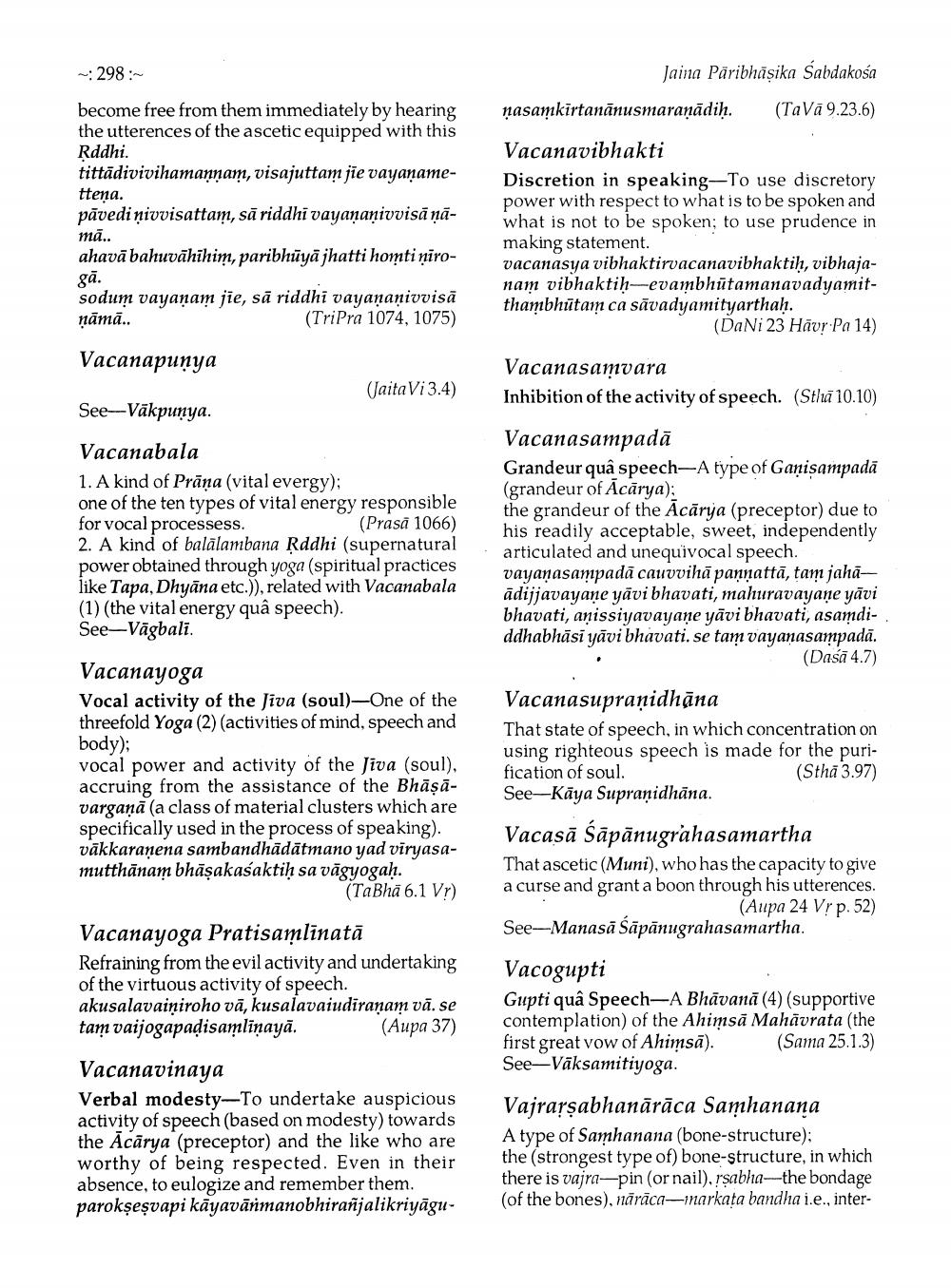________________
-298:
Jaina Pāribhāșika Sabdakosa nasamkirtanānusmaraņādiḥ. (Tavā 9.23.6)
become free from them immediately by hearing the utterences of the ascetic equipped with this Rddhi. tittādivivihamannam, visajuttam jie vayanamettena. pāvedi nivvisattam, sā riddhi vayananivvisā ņā
mā..
Vacanavibhakti Discretion in speaking-To use discretory power with respect to what is to be spoken and what is not to be spoken; to use prudence in making statement. vacanasya vibhaktirvacanavibhaktiḥ, vibhajanam vibhaktih-evambhūtamanavadyamitthambhūtam ca sāvadyamityarthah.
(DaNi 23 Hāvr Pa 14)
ahavā bahuvāhihim, paribhūya jhatti homti ņirogā. sodum vayaņam jie, să riddhi vayananivvisā nāmā..
(TriPra 1074, 1075)
Vacanapunya
(JaitaVi 3.4)
Vacanasamvara Inhibition of the activity of speech. (Sthā 10.10)
See-Vākpunya.
Vacanabala 1. A kind of Prāna (vital evergy); one of the ten types of vital energy responsible for vocal processess.
(Prasā 1066) 2. A kind of balālambana Rddhi (supernatural power obtained through yoga (spiritual practices like Tapa, Dhyāna etc.)), related with Vacanabala (1) (the vital energy quâ speech). See-Vāgbali.
Vacanasampadā Grandeur quâ speech-A type of Ganisampadā (grandeur of Acārya); the grandeur of the Ācārya (preceptor) due to his readily acceptable, sweet, independently articulated and unequivocal speech. vayanasampadā cauvvihā pannattā, tam jahāādijjavayane yāvi bhavati, mahuravayane yāvi bhavati, anissiyavayane yāvi bhavati, asamdiddhabhāsi yāvi bhavati. se tam vayanasampadā.
(Dasā 4.7)
Vacanayoga Vocal activity of the Jiva (soul)-One of the threefold Yoga (2) (activities of mind, speech and body); vocal power and activity of the Jiva (soul), accruing from the assistance of the Bhāṣāvargaņā (a class of material clusters which are specifically used in the process of speaking). vākkaranena sambandhādātmano yad viryasamutthānam bhāşakasaktiḥ sa vagyogah.
(TaBhā 6.1 Vr)
Vacanasupraạidhāna That state of speech, in which concentration on using righteous speech is made for the purification of soul.
(Sthā 3.97) See-Kāya Supranidhāna. Vacasā sāpānugrahasamartha That ascetic (Muni), who has the capacity to give a curse and grant a boon through his utterences.
(Aupa 24 V, p. 52) See-Manasā sāpānugrahasamartha. Vacogupti Gupti quâ Speech-A Bhāvanā (4) (supportive contemplation) of the Ahimsa Mahāvrata (the first great vow of Ahimsā). (Sama 25.1.3) See-Vāksamitiyoga.
Vacanayoga Pratisamlinatā Refraining from the evil activity and undertaking of the virtuous activity of speech. akusalavainiroho vā, kusalavaiudiranam vā.se tam vaijogapadisamlīnayā. (Aupa 37)
Vacanavinaya Verbal modesty-To undertake auspicious activity of speech (based on modesty) towards the Acārya (preceptor) and the like who are worthy of being respected. Even in their absence, to eulogize and remember them. parokşeşvapi kāyavārmanobhirañjalikriyāgu
Vajrarṣabhanārāca Samhanana A type of Samhanana (bone-structure); the (strongest type of) bone-structure, in which there is vajra-pin (or nail), rsabha--the bondage (of the bones), nārāca-inarkata bandha i.e., inter




